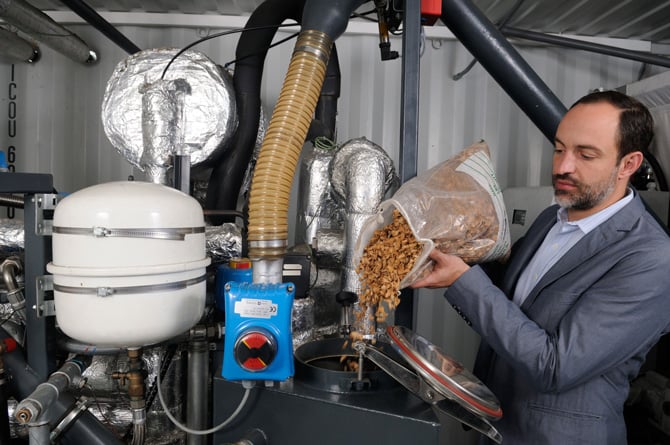
When Hurricane Maria ravaged Puerto Rico, knocking out the power grid for almost the entire island and felling thousands of trees, it created the perfect opportunity for downtown-based Arensis to deploy one of its biomass generators.
The company, launched last year at the Los Angeles Cleantech Incubator, specializes in procuring “off-grid” power for villages, mid-sized buildings and businesses where power grids are either balky or non-existent.
Arensis worked with one of its customers, Cologne, Germany-based Lufthansa Airlines, to transport a generator at a Puerto Rico airport to a sports complex being used as a shelter in Fajardo, a town near the island’s northeastern coast. The unit arrived late last month and was set to go into full operation at the community sports center this week.
“Businesses are dying and people are suffering,” said Julien Uhlig, Arensis’ chief executive. “So we got together with Lufthansa and agreed to take this power plant that’s nice to have at the airport and bring it somewhere where it’s desperately needed.”
Arensis chiefly deploys generators made by German company Entrade, of which Uhlig is also chief executive. Its generators use biomass – usually wood or agricultural waste – as fuel to create synthetic gas that then powers the generator to produce both heat and electricity.
A generator produces about 50 kilowatts of electricity, enough to power six single-family homes or a mid-sized building.
Arensis buys the generators from Entrade, then sets them up for clients who have long-term contracts to buy the power and heat produced by the generators. In the Puerto Rico crisis, however, Arensis is donating the power to Fajardo, which was hard hit by the hurricane in September.
For Arensis, this is the highest-profile use for the biomass-fueled generators it deploys on behalf of customers around the globe. Most of the 150 units it has deployed so far are in Britain, but Uhlig said contracts have also been signed this year in Asian countries including India, Indonesia, Japan and the Philippines.
Over the past several months, Uhlig said, the company has locked in about $250 million in 20-year off-grid power supply contracts. In the third quarter, which was the first one with a significant revenue stream, the company booked about $1 million in revenue; Uhlig said the contracts signed so far should produce about $40 million in revenue next year.
Uhlig, 41, a former German government official, said he got the idea to create biomass-fueled generators and start Entrade 10 years ago during a visit to Ethiopia, where he saw the immense need for power that was independent of any organized grid. The generator unit sells for about $250,000.
Uhlig started Arensis two years ago to manage off-grid power systems on behalf of customers, using biomass, solar or whatever other off-grid sources were available.
He raised $45 million in seed funding from investors – including about $15 million from an unnamed institutional investor in England and another $15 million or so from the Royal Bank of Scotland. That was enough to start developing the cloud-based software to manage the Entrade biomass-fueled generators and combine that with other sources of off-grid energy, such as solar.
Arensis set up its headquarters at the incubator campus near the Los Angeles River, where it now employs six. Most of the company’s remaining 65 employees are in Britain.
Only a handful of other companies around the globe make, deploy and operate biomass generators, according to Peter Asmus, principal research analyst with the San Francisco office of Navigant Research, a Boulder Colo.-based consultancy for clean technology companies.
One of those is Husk Power Systems, based in Bihar, India, which uses rice husks as the biomass fuel for its generators, he said.
Asmus said in the short run Arensis competes with solar-focused companies in the off-grid power market, even though Arensis does procure some solar power for its customers. But with the constant improvements and cost drops in solar and battery technologies, the question over the longer term is whether biomass will transcend its current niche status.
“Right now, biomass only accounts for about 3 percent of all off-grid power produced globally,” Asmus said. “It’s good as a backup power source, but has some limitations. The feed stock must be nearby and not too labor intensive to break down into small chunks or pellets. And with solar becoming ever cheaper, can biomass continue to compete?”
